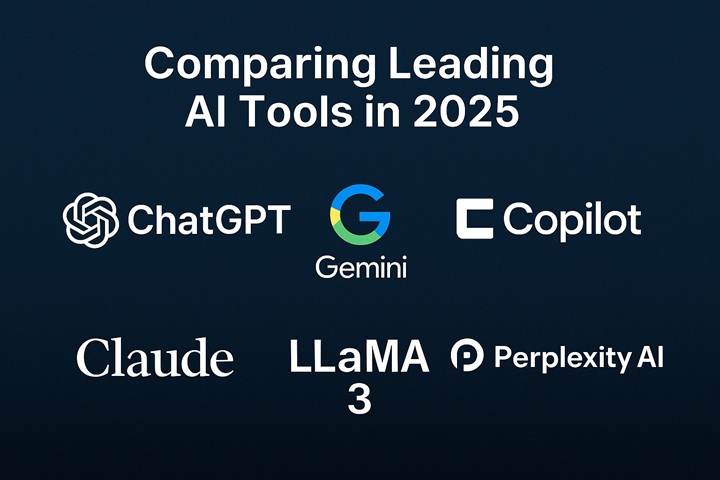Artificial intelligence (AI) continues to reshape the global digital landscape, with advanced tools driving innovation across sectors from education and finance to creative arts and cybersecurity.
As AI becomes increasingly mainstream, businesses, developers, and everyday users face the challenge of choosing the right tool for their needs.

Here’s a comparison of some of the most prominent AI platforms in 2025, evaluating their capabilities, strengths, and use cases.
1. ChatGPT (OpenAI)
Best for: Conversational AI, writing assistance, code generation
Openai’s Chatgpt remains a market leader in natural language processing. Powered by the GPT-4 and GPT-4 Turbo models, it is widely used for content creation, research support, coding, and enterprise-level chatbots. It now integrates image understanding, voice interaction, and data analytics capabilities through its Pro subscription plan, making it one of the most versatile tools.
Pros:
-
Highly accurate and conversational
-
Supports plugins and custom GPTs
-
Now includes vision, code interpreter, and voice options
Cons:
-
Most powerful features are paywalled
-
Limited real-time internet access without plugins
2. Google Gemini (formerly Bard)
Best for: Search integration, live web data, productivity with Google Workspace
Rebranded as Gemini, Google’s AI tool offers real-time data access, making it ideal for users who require up-to-date information. Its deep integration with Google Docs, Sheets, and Gmail gives it an edge in productivity workflows. Gemini’s latest release, Gemini 1.5 Pro, is geared towards developers and advanced researchers.
Pros:
-
Real-time search access
-
Natively integrated with Google services
-
Highly responsive to factual queries
Cons:
-
Limited multi-modal abilities (still maturing)
-
Some privacy concerns due to integration with user data
3. Microsoft Copilot (Powered by OpenAI)
Best for: Enterprise productivity, code assistance, Microsoft 365 integration
Microsoft’s Copilot is embedded across its suite of productivity tools—Word, Excel, Teams, and Outlook. It enhances daily work tasks with AI-powered insights, auto-generated content, and summarisation. GitHub Copilot, a separate but related tool, is popular among developers for code completion and suggestions.
Pros:
-
Deep integration with Office 365
-
Streamlines document editing and emails
-
GitHub Copilot is powerful for developers
Cons:
-
Requires a Microsoft subscription
-
Less flexible for creative or informal use cases
4. Claude (Anthropic)
Best for: Ethical AI interactions, long document processing, summarisation
Anthropic’s Claude, now in its third generation (Claude 3), focuses on safe and explainable AI. It’s known for processing lengthy texts and producing structured outputs. With a focus on transparency and user control, Claude has gained traction among legal, policy, and academic users.
Pros:
-
Strong on safety and interpretability
-
Can handle large documents and datasets
-
Transparent decision-making processes
Cons:
-
Not as creative or conversational as ChatGPT
-
Still catching up in coding and multi-modal tasks
5. Meta LLaMA 3 (Large Language Model Meta AI)
Best for: Open-source AI development, academic research, custom fine-tuning
Meta’s LLaMA models are designed to advance open AI development. LLaMA 3, expected to be fully released by mid-2025, empowers researchers and developers to fine-tune models for domain-specific applications. While not as user-friendly as commercial platforms, it offers a high degree of customisation.
Pros:
-
Open-source and free to use
-
Ideal for research and niche applications
-
Community-driven innovation
Cons:
-
Requires technical expertise
-
No mainstream user interface or tools yet
6. Perplexity AI
Best for: AI-powered research and academic references
Perplexity AI offers a search engine-style interface powered by large language models. Its key strength lies in citation-backed answers, making it ideal for academic research or fact-based writing.
Pros:
-
Reliable citation generation
-
Clean and focused UI
-
Strong for research, journalism, and reporting
Cons:
-
Less useful for general conversations
-
Limited content generation capabilities
Final Thoughts
The right AI tool depends largely on the user’s goals. For creative writing and general assistance, ChatGPT leads the pack. For real-time information and productivity integration, Gemini and Microsoft Copilot shine. Claude offers a safe, research-friendly alternative, while Meta LLaMA 3 fuels open innovation. Perplexity AI excels in citation-driven research.
As AI continues to evolve rapidly, the competition among these tools is driving innovation—and offering users more powerful, tailored solutions than ever before.
Support InfoStride News' Credible Journalism: Only credible journalism can guarantee a fair, accountable and transparent society, including democracy and government. It involves a lot of efforts and money. We need your support. Click here to Donate
